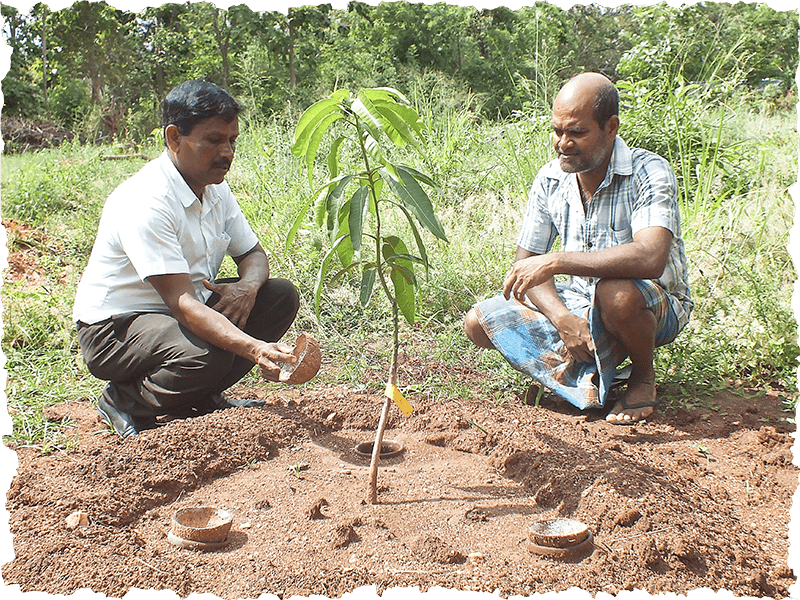 Lessons
from CSIAP in Advancing Gender Equality in Agriculture and Irrigation Sectors (An
article on International Women's Day)
Lessons
from CSIAP in Advancing Gender Equality in Agriculture and Irrigation Sectors (An
article on International Women's Day)
In
Sri Lanka, where 25.9% of the population was living below the poverty line in
2023, poverty continues to be a pressing issue. Rural communities, particularly
those dependent on agriculture and minor irrigation, face the dual challenges
of economic hardship and climate vulnerability. Among them, women often bear
the brunt of poverty due to systemic gender inequalities and limited access to
resources. However, projects like the Climate Smart Irrigated Agriculture
Project (CSIAP) are making strides in improving the lives of women and rural
communities, demonstrating the power of inclusive development.
The
CSIAP, a critical initiative under the Ministry of Agriculture, Livestock,
Lands, and Irrigation (MoALLI), has focused on improving smallholder
agriculture's productivity and climate resilience since 2019. The project
targets vulnerable agrarian communities in climatically sensitive regions,
where farmers many depend on rain-fed and minor irrigation systems. These
areas, which span 11 districts, are facing growing challenges due to climate
change, depleting natural resources, and an increasingly uncertain economic
environment
Ensuring
Gender Equality in Agriculture and Irrigation Sectors
The CSIAP's commitment to gender equality and
social inclusion is evident in its actions. Women, especially those in
vulnerable groups such as female-headed households, single mothers, the
elderly, and those living below the poverty line, often struggle to access
opportunities within the agricultural sector. CSIAP addresses these challenges
through targeted interventions that foster women’s participation in
decision-making, leadership roles, and economic activities.
The project has taken significant steps to ensure that at least
30% of all participants in all project activities, including Farmer
Organizations (FOs), Social Audit Committees (SACs), Producer Societies (PSs),
Producer Associations (PAs) and Cascade Management Committees (CMCs) are women.
This ensures that women not only have a voice but also play a key role in
shaping the future of agricultural practices and policies at the community
level. Through this, CSIAP has promoted the idea that gender equality is
crucial not only for social justice but also for the accelerated development of
sustainable agricultural systems.
Empowering
Women in Leadership Roles
A
major lesson from CSIAP has been the importance of empowering women in
leadership. Through capacity-building programs, CSIAP has enhanced the
confidence of women farmers and enabled them to take on leadership positions in
agricultural committees. Women’s involvement in these roles has proven to be
transformative for both individuals and the broader community. Female
leadership within Farmer Organizations and Producer Societies has led to more
inclusive and equitable decision-making, ensuring that women’s specific needs
and concerns are addressed.
The
project has also promoted female participation in critical committees such as
the Social Audit Committees (SACs) and Cascade Management Committees (CMC),
where women’s input has been pivotal in decision making, promoting sustainable
agricultural and water management practices. The high levels of female
participation 31.98% in SACs and 30.64% in CMCs show that women are not only
included but are central to the governance structures that shape the future of
agriculture and irrigation at the grassroots level.
Breaking
Down Barriers: Addressing Gender-Specific Challenges
CSIAP’s commitment to
gender-sensitive policies is another key factor in its success. Women in
agriculture face distinct challenges, including time constraints due to
household responsibilities, limited mobility, and barriers to accessing
technology and financial resources. CSIAP has tackled these issues by
implementing gender-responsive strategies, such as providing training sessions
and promoting flexible participation methods. This has led to an increase in
women’s engagement, ensuring that they can balance their household duties with
active involvement in agricultural programs. However, CSIAP was unable to
provide the childcare facilities during training sessions, which is noticed as
a critical need in the grassroots level to break the barriers of women for the
active participation in project activities.
In
addition, CSIAP has addressed the financial empowerment of women farmers.
Access to financial literacy training through the Farmer Business School has
enabled many women to invest in their farms, diversify their income sources,
improve their livelihoods, and become an entrepreneur.
Social
Inclusion and Vulnerability Reduction
CSIAP
also emphasizes the inclusion of marginalized and vulnerable groups, such as
people with disabilities, landless peasants, and those living in poverty. By
prioritizing these groups in the selection criteria for agricultural programs,
the project ensures equitable access to resources. The integration of socially
inclusive policies means that vulnerable women, who are often the most
disadvantaged, have the opportunity to improve their living standards and
secure a more stable future.
Furthermore,
CSIAP has actively worked to prevent Gender-Based Violence (GBV) in its project
areas. Through awareness campaigns, GBV prevention measures, and the
implementation of a Code of Conduct (COC) on prevention of GBV for contractors
and their laborers, the project has created safer spaces for women to engage in
economic activities without fear of violence or harassment. This has been a
critical step in ensuring that women can participate fully in agricultural and
irrigation programs without facing additional social risks.
A
Model for Future Development
As
we celebrate International Women’s Day, CSIAP’s work stands as a testament to
the power of inclusive development. By promoting women’s leadership, providing
gender-sensitive support, and ensuring equitable access to resources, the
project has empowered countless women in Sri Lanka’s rural areas. The lessons
learned from CSIAP are clear: when women are given the equipment, resources,
and opportunities to thrive, they can transform not only their lives but also
the agricultural landscape for future generations.
On
this Women’s Day, we honor the women of Sri Lanka who are leading the way in
agriculture and minor irrigation, proving that gender equality is not just a
lofty ideal but a practical and essential pathway to sustainable development.
Through continued commitment to gender inclusion, CSIAP has laid a strong
foundation for a more resilient and equitable agricultural sector, and its
impact will be felt for years to come.
By Sharmila Shanmuganathan, Social Safeguard and Gender Development
Officer, PMU, CSIAP
Posted by CSIAP Sri LankaRead full articlePublished Date : 2025-03-08





